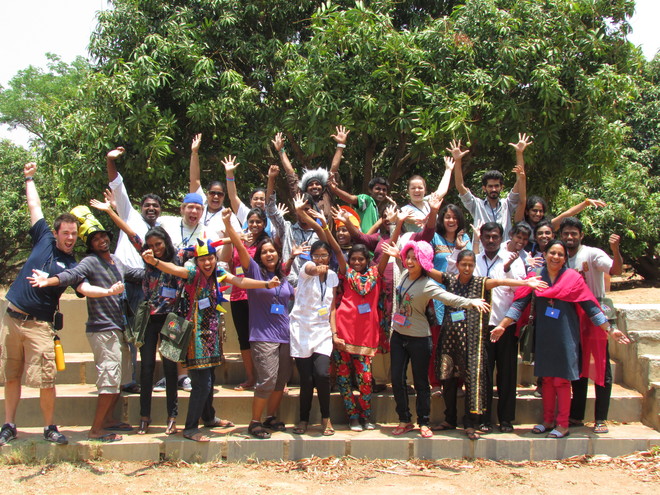
ASHA in Bengaluru is working with unsuspecting HIV-positive women and children. Volunteers of the foundation at a summer camp held for HIV-infected children
Kavita Kanan Chandra
It was the painful death of a lonely American man in 1987 in a Bengaluru hospital that jolted a young consultant physician Glory Alexander. “Do you think I have AIDS?” The question made Glory rush to the library to leaf through the Oxford textbook for the acronym as she had not even heard about it. For want of testing facility in Bengaluru, the blood sample was sent to the the Christian Medical College (CMC) Vellore. The victim died much before the result announcing his positive status was received 36 hours later. That was Glory’s first case of AIDS though she didn’t see any other till 1995-1996.
Out of sheer ignorance of medical experts, the patients would be treated for pneumonia or other symptoms and discharged without the primary disease being treated. Also there was a lot of stigma attached to the disease not only in society but discrimination was rampant in hospitals too.
This prompted Glory to quit her job and find Asha Foundation (Action Service and Hope for AIDS) in 1998. An MD in internal medicine, she was a consultant physician at Baptist Hospital.
The ASHA Foundation’s aim was to work for the prevention, awareness, treatment, care, support and rehabilitation of HIV (human immunodeficiency virus) infected and AIDS (acquired immune deficiency syndrome) patients. “In early days we lost many patients when drugs were not easily available and treatment was prohibitive,” said Glory. The AIDS patients could only be saved since 2004 when anti-retroviral therapy (ART) became available in India. It met with a huge success and the government, too, provided free treatment to the patients from its ART centres. The patients, however, needed counselling for they could not miss the exact time and date of treatment and it has to be continued lifelong. The ASHA Foundation turned into counsellors and friends for the HIV patients and renewed their hope for life. They also provided free or discounted treatment.
It was through sheer ignorance that many unsuspecting women and children contracted HIV. It was either due to sex with HIV-infected partner, infected blood transfusion or an infected mother passed on infection to children during delivery. Padma Kumari and Dhanalakshmi were such innocent victims who wanted to end their life when tested positive with AIDS. It was the intervention of ASHA Foundation which they emotionally call their ‘mother’s home’ that urged them to get ART treatment, restored their dignity and trained them to work as primary teachers.
There are many such women ASHA has empowered through education, vocational training, job placements, microcredit and formation of self-help groups. It also provides educational and nutritional support to children of HIV-positive parents through care and support, services for children-at-risk, HIV/AIDS clinic, free consultation and services are provided to HIV-positive patients and their families.
It was the prevention from mother-to child-transmission [PMCT] that became closest to Glory’s heart. The foundation had tested 1,40,000 mothers and found 750 HIV positive cases till 2003, well before HIV tests became mandatory. With timely intervention the transmission was drastically reduced. The PMCT was started in 2002 and included into antenatal services in hospitals. A HIV+ve mother has 40 per cent chance of delivering HIV+ve child but it could be reduced to just two per cent if she starts on medications to prevent the transmission of HIV infection to her child.
“We have also introduced Camp Rainbow for HIV +ve children who were born prior to 2004 when PMCT mothers were not tested. We tell them about HIV in a subtle way,” said Glory. This is the second year when infected children between 10-16 years are taken for four to five days’ duration summer camps.
The ASHA Foundation has introduced an adolescent health education project, ‘anmol ashayein’ (precious hopes) in several schools in Karnataka and beyond. The curriculum is developed in-house and teachers are trained in respective schools to conduct classes for children in 13-15 years age group.
The ASHA Foundation has received recognition as Scientific and Industrial Research Organisation by the Department of Scientific and Industrial Research (Union Ministry of Science and Technology, It has published many research papers on the PMCT, Adolescent Health Education, Paediatric HIV Infection, Adult HIV infection, Epidemiology of HIV/AIDS and Counselling.



























